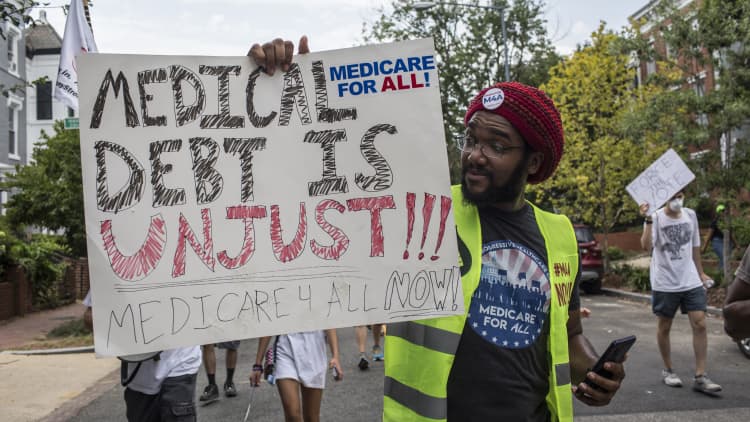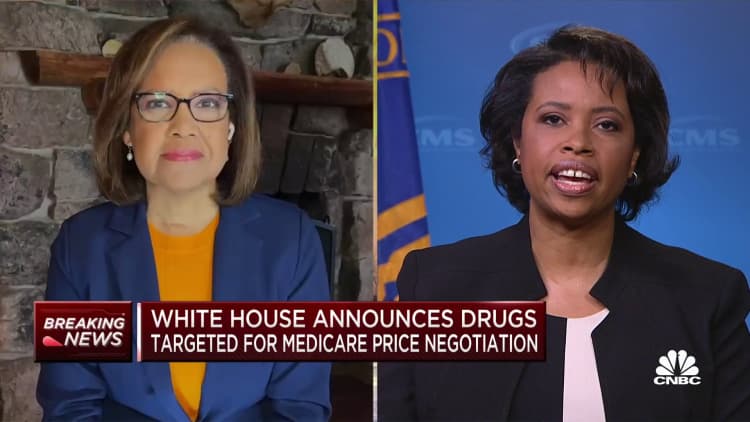U.S. President-elect Donald Trump gets here on November 13, 2024 at Joint Base Andrews, Maryland.
Andrew Harnik|Getty Images
President-elect Donald Trump’s go back to the White Home is poised to have huge influence on customer healthcare.
Republicans might deal with couple of legal obstructions with their objectives of improving medical insurance in the U.S., specialists stated, after the celebration kept its slim bulk in your house of Representatives and turned the Senate, providing it control of both Congress and the presidency.
Families that get medical insurance from Medicaid or an Affordable Care Act market strategy might see a few of the greatest disturbances, due to reforms looked for by Trump and Republican politician legislators, according to health policy specialists.
Such reforms would maximize federal funds that might be utilized to assist spend for other Republican policy concerns like tax cuts, they stated.
Simply under 8% of the U.S. population is uninsured today– the most affordable rate in American history, stated Michael Sparer, a teacher at Columbia University and chair of its Department of Health Policy and Management. That figure was 17% when the Affordable Care Act was enacted more than a years earlier, he stated.
” That rate will begin increasing once again,” Sparer stated.
Trump revealed on Nov. 14 that he wishes to tap Robert F. Kennedy Jr. to run the Department of Health and Person Solutions, that includes the Centers for Medicare & & Medicaid Solutions. CMS, in turn, administers the Affordable Care Act market and the Kid’s Medical insurance Program, or CHIP, to name a few undertakings.
Robert F. Kennedy Jr. consults with Republican governmental candidate previous President Donald Trump at a Turning Point Action Rally in Duluth, GA on Wednesday, Oct. 23, 2024.
The Washington Post|The Washington Post|Getty Images
Kennedy, a vaccine doubter who’s been implicated of spreading out conspiracy theories, has actually promised to make huge modifications to the U.S. health-care system.
A representative for Trump’s shift group did not react to a demand from CNBC for remark about the president-elect’s health policy strategies.
Here’s how healthcare might alter for customers throughout the inbound Trump administration, according to specialists.
Affordable Care Act market
A laboratory service technician takes care of a client at Providence St. Mary Medical Center on March 11, 2022 in Apple Valley, California.
Mario Tama|Getty Images News|Getty Images
‘ Betting’ superior aids will end
Based Upon how the election went, the improved aids on the Affordable Care Act will likely not be restored when they end at the end of 2025, stated Cynthia Cox, vice president and director of the ACA program at KFF, a health policy research study company.
” If I was going to put a bet on this, I ‘d be a lot more comfy wagering that they are going to end,” Cox stated.
More from Personal Financing:
What Trump’s tariff strategy might imply for your wallet
What a Trump presidency might imply for your taxes
What Trump might imply for the real estate market
That government-backed help, initially passed throughout the pandemic under the American Rescue Strategy in 2021, has actually substantially reduced the expenses of protection for individuals purchasing medical insurance intends on the ACA market. Those clients consist of anybody who does not have access to an office strategy, such as trainees, self-employed customers and out of work individuals, to name a few.
A specific making $60,000 a year now has a month-to-month premium of $425, compared to $539 before the improved aids, according to a rough price quote offered by Cox. On the other hand, a household of 4 making about $120,000 presently pays $850 a month rather of $1,649.
Completely extending the improved ACA aids might cost around $ 335 billion over the next ten years, according to a price quote by the Congressional Spending Plan Workplace.
” They’re worried about the expense, and they’re going to be cutting taxes next year likely,” Cox stated, of Republicans.
Still, it’s a ‘huge’ gamble to give up medical insurance
Around 3.8 million individuals will lose their medical insurance if the aids end, the Congressional Spending Plan Workplace approximates. Those who preserve their protection are most likely to pay greater premiums.
” The bottom line is unpredictability,” stated Sabrina Corlette, co-director of the Center on Medical Insurance Reforms at Georgetown University’s McCourt School of Public Law.
” Fortunately for market customers is that the improved [subsidies] will be readily available through 2025, so there must be no instant modifications,” Corlette included.

Even if the aids vanish, specialists state it is very important to remain registered if you can, even if you need to make compromises on protection to keep the expenses within spending plan.
Registering in a strategy, even a less expensive strategy with a huge yearly deductible, can supply an essential hedge versus big expenses from unpredicted medical requirements like surgical treatment, stated Carolyn McClanahan, a doctor and accredited monetary coordinator based in Jacksonville, Florida.
” I can’t stress how huge a gamble it is to go without medical insurance,” stated McClanahan, creator of Life Preparation Partners and a member of the CNBC Financial Consultant Council.
” One cardiovascular disease quickly costs $100,000″ expense for somebody without insurance coverage, she stated. “Do you have that to pay?”
Medicaid
A ‘quite huge target’ for legislators
Medicaid is the third-largest program in the federal spending plan, representing $616 billion of costs in 2023, according to the Congressional Spending Plan Workplace. Trump campaigned on a pledge not to make cuts to the 2 biggest programs: Social Security and Medicare.
That makes Medicaid the “apparent location” for Republican politicians to raise income to fund their program, stated Larry Levitt, executive vice president for health policy at KFF.
” Medicaid will have a quite huge target on its back,” Levitt stated.
The bottom line is unpredictability.
Sabrina Corlette
co-director of the Center on Medical Insurance Reforms at Georgetown University’s McCourt School of Public Law
Cuts would “undoubtedly imply” less homes would get advantages, Levitt stated. Medicaid receivers tend to be lower-income homes, individuals with impairments and elders in retirement home, he stated.
Medicaid cuts were a huge part of the push amongst Trump and other Republican legislators to reverse and change the Affordable Care Act, likewise referred to as Obamacare, in 2017, Levitt stated.
Those efforts were eventually not successful.
How Medicaid may be cut
Maskot|Maskot|Getty Images
The brand-new Medicaid cuts might take numerous kinds, according to specialists, who mention previous propositions and remarks from the Trump administration, Republican legislators and the Task 2025 conservative policy plan.
For instance, the Trump administration might attempt to include work requirements for Medicaid receivers, as it did throughout his very first term, stated Sparer of Columbia University.
In addition, Republicans might attempt to top federal Medicaid costs designated to states, specialists stated.
The federal government matches a part– typically 50% or more– of states’ Medicaid costs. That dollar amount is uncapped.
Republicans might attempt to concealed Medicaid to a block grant, where a repaired quantity of cash is offered each year to each state, or institute a per-capita cap, where advantages are restricted for each Medicaid enrollee, Levitt stated.
Legislators might likewise attempt to roll back the Medicaid growth under the Affordable Care Act, which widened the swimming pool of individuals who receive protection, specialists stated.
They might do this by cutting federal funding to the 40 states, plus the District of Columbia, that have actually broadened Medicaid eligibility. That would move “a huge monetary danger to states, and numerous states as an outcome would drop the Medicaid growth,” Levitt stated.
Short-term medical insurance strategies
Under the previous Trump administration, customers saw a boost in the accessibility of non-ACA certified medical insurance choices, consisting of short-term strategies, specialists state. The very same is most likely to occur over the next 4 years.
Short-term medical insurance prepares deal protection for minimal quantities of time, and usually on less medical services than detailed protection.
Supporters of these strategies state they permit insurance providers to provide customers lower month-to-month premiums since they’re not needed to cover as numerous services. At the very same time, the strategies have the ability to decline individuals with pre-existing conditions or charge them more. While Trump remained in workplace, registration in short-term strategies surged.
The U.S. Capitol in Washington, D.C., Oct. 4, 2023.
Yasin Ozturk|Anadolu Firm|Getty Images
” The previous Trump administration and numerous in the GOP have actually required broadening the marketing and sale of short-term strategies and other insurance coverage items that do not need to please the ACA’s pre-existing condition requirements and other customer securities,” stated Georgetown University’s Corlette.
She stated that customers can be drawn in to the prepare for their low expenses, however typically discover far too late how thin the protection is.
Drug rates

It’s uncertain if legislators would keep the drug policies undamaged, specialists stated. Trump signed executive orders in 2020 targeted at reducing expenses for prescription medications, for instance.
” It’s not clear Trump will be a good friend of the pharma market,” Sparer stated.
For instance, the Inflation Decrease Act offered the federal government– for the very first time– the authority to work out rates with pharmaceutical business over some drugs covered by Medicare.
That arrangement is slated to begin for 10 drugs– a few of Medicare’s “most expensive and most utilized” medications, dealing with a range of disorders like cardiovascular disease, diabetes, arthritis and cancer– in 2026, according to the Centers for Medicare & & Medicaid Solutions.
The step will conserve clients $1.5 billion in out-of-pocket expenses in 2026, CMS quotes. The federal government would broaden the list of medications in occurring years.
The Inflation Decrease Act likewise topped Medicare copays for insulin at $35 a month. They were formerly uncapped. The typical Medicare Part D insulin user had actually paid $54 expense a month per insulin prescription in 2020, according to KFF.
The law likewise topped out-of-pocket expenses at $2,000 a year for prescription drugs covered by Medicare, beginning in 2025. There was formerly no cap.
About 1.4 million Medicare Part D enrollees paid more than $2,000 expense for medications in 2020, KFF discovered. Those expenses balanced $3,355 an individual.


